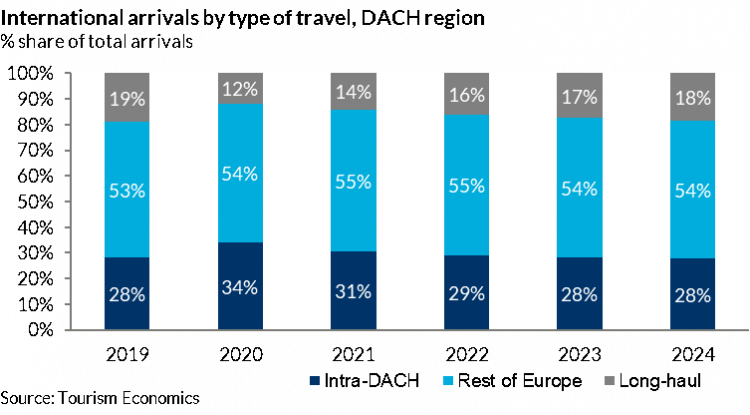The Travel & Tourism outlook for the DACH region

The DACH region is set to experience major losses in 2020 as the adverse effects of the global health crisis continue to be felt across the world. We forecast a 52% drop in international travel and a slightly lesser decline of 39% for domestic travel in 2020.
The coronavirus outbreak has instigated a marked change in traveller preferences, with many tourists choosing to travel domestically instead of taking a foreign trip due to stringent travel restrictions and enduring health concerns. A sizeable outbound travel market, accounting for almost 50% of total trips taken by DACH residents in 2019, provides optimism that the domestic market will support the initial travel recovery. The domestic share of total trips taken by residents in the DACH region is set to expand to 60% in 2020, up from 52% in 2019.
A lesser reliance on long-haul travel will be advantageous for the international travel rebound, with travel from intra-DACH and the wider European region accounting for 81% of international arrivals in 2019. As traveller confidence is greater for closer to home markets, travel from intra-DACH and rest of Europe will rise further in 2021, accounting for 88% of international arrivals. However, a protracted recovery for business travel will slow the overall travel recovery, with pre-coronavirus levels of inbound arrivals not being reached again until 2024.

City travel across the DACH region continues to suffer against the instability in the global environment, with ongoing travel restrictions, social distancing requirements and health concerns all lowering travel demand. Domestic travel to the DACH cities is forecast to fall 40% in 2020, compared to a 51% decline for international travel.
A sizeable domestic market, accounting for almost 60% of total arrivals to the DACH cities in 2019 will encourage a less volatile travel recovery, while the DACH cities will likely gain from increased domestic substitution due to the unpredictability surrounding international travel during the pandemic. This increased domestic travel demand will particularly support the recovery of cities such as Vienna, Geneva and Zurich, as they received less than a third of total arrivals from domestic tourists in 2019 and are more exposed to the drop in international travel.
International travel will be slower to recover as tourists opt for more rural or coastal locations due to social distancing requirements and lingering health concerns associated with visiting cities; while the drop in business travel will have a disproportionate impact on cities. We anticipate that 95% of the DACH cities will have recovered 2019 levels for international travel by 2024.


